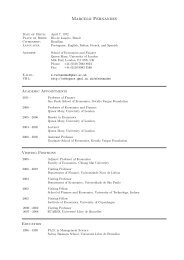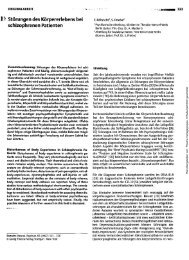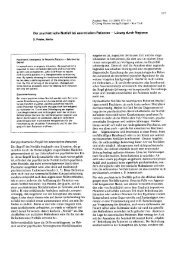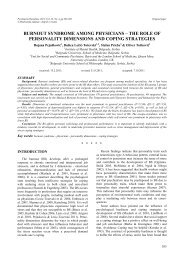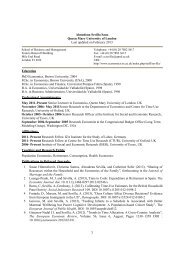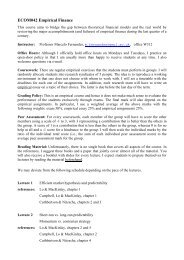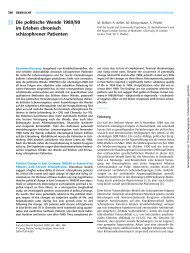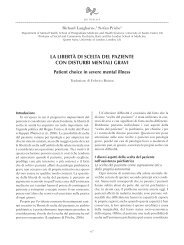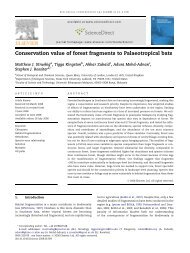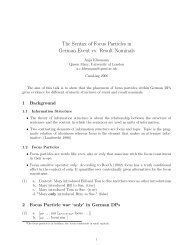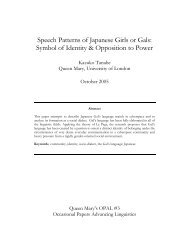Proofs - Personal Webspace for QMUL - Queen Mary, University of ...
Proofs - Personal Webspace for QMUL - Queen Mary, University of ...
Proofs - Personal Webspace for QMUL - Queen Mary, University of ...
Create successful ePaper yourself
Turn your PDF publications into a flip-book with our unique Google optimized e-Paper software.
3.3.2. German experiences<br />
Despite the situation several years ago, meanwhile a number<br />
<strong>of</strong> cross- cultural training programmes <strong>for</strong> health care (budding)<br />
pr<strong>of</strong>essionals are <strong>of</strong>fered. For example, medical students have<br />
the opportunity to learn about a variety <strong>of</strong> cross- cultural issues<br />
in some <strong>of</strong> the 36 German university medical centres. Other<br />
educational institutions also <strong>of</strong>fer cross- cultural training with<br />
various perspectives catering <strong>for</strong> different occupational health<br />
care groups. So far there are hardly any studies <strong>of</strong> evaluated<br />
cross- cultural mental health training in Germany.<br />
In general there is a high degree <strong>of</strong> interest in cross- cultural<br />
educational programmes <strong>for</strong> this occupational group. The result<br />
<strong>of</strong> a census <strong>of</strong> psychotherapists in private practice showed that<br />
72% <strong>of</strong> mental health care providers think that cross- cultural<br />
competence training is helpful <strong>for</strong> the therapeutic work <strong>for</strong><br />
patients with a different migration background [31]. Nine per<br />
cent <strong>of</strong> the providers have already participated in such training.<br />
The need <strong>for</strong> such training is also highly valued by medical<br />
educational providers. More than 80% <strong>of</strong> the heads <strong>of</strong> these<br />
psychiatric educational institutions see a great need <strong>for</strong> cross-<br />
cultural issues in further education with focus on cross- cultural<br />
competencies and cultural aspects <strong>of</strong> mental disorders [11].<br />
Although health care providers and educational institutions<br />
see the need <strong>for</strong>, and are interested in, cross- cultural issues there<br />
is much work to be done be<strong>for</strong>e they are an integral part <strong>of</strong> the<br />
educational curriculum <strong>for</strong> mental health care pr<strong>of</strong>essionals in<br />
Germany.<br />
A promising development in further promoting cross-<br />
cultural issues in the education <strong>of</strong> health care pr<strong>of</strong>essionals is<br />
characterised by two initiatives. Psychotherapeutic educational<br />
institutions are doing more and more to integrate cross- cultural<br />
issues in their curricula. Also, there is a national initiative <strong>for</strong><br />
developing a nationwide list <strong>of</strong> cross- cultural learning targets<br />
<strong>for</strong> university medical education, which will be later integrated<br />
in the teaching and examinations.<br />
4. Discussion<br />
4.1. On conceptualisation <strong>of</strong> training<br />
Cross- cultural psychiatry, psychology, nursing and related<br />
fi elds are important in the basic education <strong>of</strong> health and mental<br />
health pr<strong>of</strong>essionals. Institutionalised training <strong>of</strong> students as well<br />
as mental health pr<strong>of</strong>essionals is essential. In treating culturally<br />
different people with mental disorders self- refl ection is a necessary<br />
component. Developing, conducting and evaluating helpful,<br />
adequate and sustainable cross- cultural training programmes<br />
that fi t the very special needs <strong>of</strong> pr<strong>of</strong>essionals in the particular<br />
mental health care services is a major challenge.<br />
So far research on cross- cultural training has <strong>of</strong>ten been<br />
focused on the cultural competence perspective. However,<br />
we consider using the cultural competence conceptualisation<br />
in mental health care training to be a problematic issue as it<br />
encourages an understanding <strong>of</strong> culture in biomedical terms. The<br />
term cultural competence easily directs thinking towards some<br />
<strong>for</strong>m <strong>of</strong> specifi c entity or skill that one can achieve. In terms <strong>of</strong><br />
culture it also implies something static.<br />
S. Bäärnhielm et al. / European Psychiatry 27 (2012) / supplement n°2 / S70-S75 S73<br />
Medical pr<strong>of</strong>essionals are trained to have faith in their own<br />
competence. In cross- cultural encounters between patient and<br />
provider the opposite stance is important, i.e. relinquishing the<br />
stance <strong>of</strong> expert in the encounter and instead grasping the opportunity<br />
to learn about patient’s culture. After basic knowledge in<br />
topics such as intercultural communication and migration and<br />
health, a humble self- refl ective position and an interest in the<br />
individual and his/her sociocultural context should characterize<br />
the care provider’s attitude. Ethnographic approaches, <strong>of</strong><br />
curiosity and a desire to learn about the culture and context <strong>of</strong><br />
the other, may contribute to non- stereotyping knowledge about<br />
the individual patient and improve the interaction. Clinging to a<br />
position <strong>of</strong> being a competent cultural expert may result in stereotyping<br />
<strong>of</strong> the patient. In contrast, the pr<strong>of</strong>essional who does not<br />
feel culturally competent may refrain from continuing to help<br />
the patient, thus excluding her/him. Further, current work in<br />
anthropology looks at culture with a processual understanding,<br />
whereby culture is located ‘between’ people and not in the minds<br />
<strong>of</strong> individuals [27]. This interactive perspective on culture may<br />
be diffi cult to grasp if the focus is mainly on competency.<br />
For training and evaluation research an alternative conceptualisation<br />
to the cultural competence framework needs to be<br />
considered. Several interesting conceptualisations have been<br />
suggested, such as culture humility and cultural safety. The<br />
approach <strong>of</strong> the Transcultural Centre, by using a needs assessment<br />
as a part <strong>of</strong> the training conceptualisation, can be one way<br />
to meet the participants where they are. However, in the long<br />
run, needs assessment has to be combined with theoretical conceptualisations.<br />
Practical tools such as the Cultural Formulation<br />
(CF) <strong>of</strong> the DSM- IV can be helpful to enhance the providers’ diagnostic<br />
competence and to contribute to improvement <strong>of</strong> clinical<br />
praxis. The CF means an ethnographic approach that supports<br />
an individualised understanding <strong>of</strong> the patient’s perspective on<br />
suffering, meanings given to illness and self- refl ection.<br />
Additional to the problems with conceptualisation <strong>of</strong><br />
cross- cultural training, there is a lack <strong>of</strong> documentation about<br />
training content and the didactics <strong>of</strong> cross- cultural training. To<br />
promote further research on cross- culture training standardised,<br />
psychometric evaluated and validated instruments need to<br />
be developed and used [12,10]. The use <strong>of</strong> additional instruments<br />
and qualitative methods like direct observations, videotaped<br />
sessions, or Objective Structured Clinical Examination<br />
(OSCE) [1] will be helpful. The improvement <strong>of</strong> content quality<br />
can be achieved by evaluating different training components<br />
<strong>of</strong> cross- cultural aspects related to diagnostically (e.g. cultural<br />
<strong>for</strong>mulation) and process- related issues. In the future, various<br />
aspects <strong>of</strong> evaluation research should be focused. As the duration<br />
<strong>of</strong> different training programmes varies greatly a dose- response<br />
relationship has to be taken into account. If the dose is substantial<br />
a catamnesis should be considered in order to evaluate the<br />
long- term effect.<br />
Due to the methodological restrictions <strong>of</strong> quantitative<br />
evaluation, complementary qualitative analyses, particularly<br />
in institutional settings, may enhance the validity <strong>of</strong> the study<br />
results. Anthropological fieldwork can help to explore the<br />
dynamics <strong>of</strong> the possible consequences <strong>of</strong> training by employing<br />
a descriptive approach, as everyday experiences <strong>of</strong> prejudice<br />
and hidden or open discrimination cannot be assessed with<br />
self- reporting instruments.<br />
<strong>Pro<strong>of</strong>s</strong>



